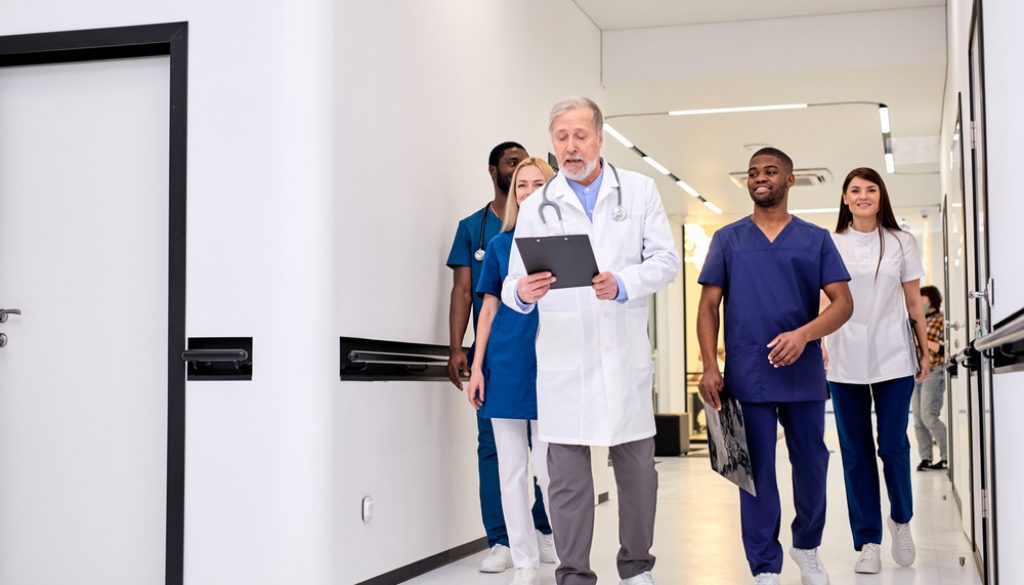Keeping Education Alive in the Hospital
Continual success in the hospital revolves around teaching and learning. Both teaching and learning are key ingredients to keeping hospitalists educated, well-informed, and abreast of the latest in medicine.
Teaching and learning go hand in hand. While it’s not only valuable to stay up to date with continuing education, but also just as important to take time out to share that knowledge with other team members. As the Roman philosopher Seneca once said, “while we teach, we learn;” and that’s because teaching improves self-efficacy, confidence, and motivation. Have you taken any time out recently to brush up on your CME and then pass that information along to your colleagues or leadership team?
Continuing Medical Education
Clinicians should consider continued learning an endeavor for the duration of their medical careers. Not only is it essential for maintaining and developing knowledge, skills, and relationships, it ensures the overall safety in individual and team clinical practices. While CME takes on various forms, the current COVID-19 pandemic has pivoted most continuing education towards utilizing online platforms.
With so many competing priorities, it can be easy to tune out or not take full advantage of opportunities for collaboration with virtual CME. Studies published in PubMed have shown that CME has been effective at improving clinical skills, however, multiple exposure and instructional techniques should be employed whenever possible.
These educational methods may include any of the following (National Institutes of Health):
- Academic detailing
- Audience response systems
- Case-based learning
- Clinical experiences
- Demonstration
- Discussion group
- Feedback
- Lecture
- Mentorship
- Problem-based or team-based learning
- Programmed learning
- Readings
- Role play
- Simulation
- Standardized patient
- Writing and authoring
Whichever CME route you decide to go, it’s important that you put yourself in a learning environment that will allow you to grow, refine your skills, and improve the quality of your care as a medical practitioner.
Peer-to-peer Participation
Although CME is one of the most important steps you can take in excelling in your specific industry, did you know that peer-to-peer education and mentorship is also just as important? Peer-to-peer learning should be a supplemental initiative to standard CME. Learning by teaching is a strategy that has gotten a lot of attention lately, and for good reason. When someone learns something and goes on to teach it to someone else such as a peer, the person teaching develops a greater understanding of the material and improves learning outcomes. This method also helps to develop social-emotional learning skills, too.
Some hospitals and medical groups have peer-to-peer programs in place to focus on the importance of teaching through workshops and faculty mentorship pairings. Participants in the programs pair up into groups – peer-to-peer and/or faculty and mentee. Through these pairings, clinicians can talk through specific challenges, new advancements, time management, scenarios, and training. They can also improve in areas such as professional skills, leadership, autonomy, and giving/receiving positive feedback. Because multiple people are involved, this type of education also lessens the burden on a single instructor.
The Best of Both Worlds
When employed together correctly, clinicians can come together to share the common goals of improving patient satisfaction, outcomes, and care, while developing and advancing necessary skills as medicine constantly evolves. Does your hospital focus on the importance of both CME and peer-to-peer participation? If so, make it your priority to take full advantage! If not, perhaps you can make suggestions for these programs and be a catalyst for positive change.
Contact Advanced Care Hospitalists to Learn More
ACH is a Lakeland-based hospitalist group providing comprehensive patient care in community hospitals across Central Florida. If you are interested in learning more about our programs, services, providers or becoming a partner facility, please call us at 863-816-5884 or fill out a contact form online.




